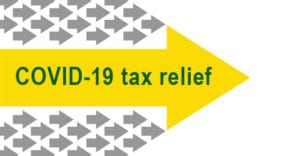
The coronavirus (COVID-19) pandemic is impacting businesses in every part of the country. In response, Congress recently passed new legislation designed to provide economic relief and the IRS issued new guidelines that extended the April 15, 2020 tax deadline and allowed taxpayers to defer any amount of federal income tax payments until July 15, 2020 — without any penalty or additional interest.
The Families First Coronavirus Response Act
On March 18, the Senate passed the House’s coronavirus bill, the Families First Coronavirus Response Act, and President Trump signed the bill that day. This legislation provides:
- Paid leave benefits to employees
- FICA tax relief for employers
- Tax credits for employers and self-employed taxpayers
An extension for filing and paying taxes
In addition to the new legislation, the IRS released Notice 2020-18, which provides relief for taxpayers with a federal income tax payment due April 15, 2020. The new due date for making federal income tax payments is now postponed to July 15, 2020.
Important: Along with extending the deadline for tax payments, the IRS announced that the 2019 income tax filing deadline would be moved from April 15, 2020 to July 15, 2020 .
Treasury Department Secretary Steven Mnuchin announced on Twitter, “We are moving Tax Day from April 15 to July 15. All taxpayers and businesses will have this additional time to file and make payments without interest or penalties.”
This announcement is a shift from previous statements in which the U.S. Treasury Department and the IRS stated that taxpayers could defer making income tax payments for 2019 and estimated income tax payments for 2020 due April 15 (up to certain amounts) until July 15, 2020. Now the federal government states that taxpayers are not required to pay or file a tax return until July 15, 2020.
However, if you’re expecting a tax refund, you should file as soon as possible in order to receive the refund money. You can still apply for an automatic filing extension for October 15, 2020 by filing IRS Form 4868.
No limit on the amount deferred
Notice 2020-18 also offers clarification regarding the amount of money eligible for deferment The IRS stated: “There is no limitation on the amount of the payment that may be postponed.” Again, this is a change from previous statements in which the IRS announced dollar limits on the tax deferrals. With the new announcement made on March 2, all taxpayers can postpone payments “regardless of the amount owed.”
Please note that the due dates established by Notice 2020-18 applies only to federal income tax payments for 2019 normally due on April 15, and 2020 and federal estimated income tax payments (including estimated payments on self-employment income) due on April 15, 2020 for the 2020 tax year.
As of this writing, the IRS hasn’t provided a payment extension for the payment or deposit of other types of federal tax, including payroll taxes and excise taxes.
Stay up to date
We’ve provided the basic outlines of the federal tax relief available at the time, but new details come out daily. Also, it is important to remember that many states have also initiated tax relief programs in response to COVID-19. Furthermore, Congress continues to work on additional legislation to provide relief, including sending checks to people earning under a certain income threshold and providing relief to various industries and small businesses.
We’ll keep you updated. In the meantime, contact us with any questions you have about your situation.


